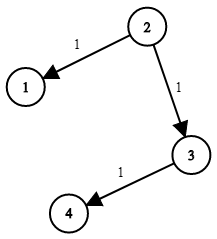You are given a network of n nodes, labeled from 1 to n. You are also given times, a list of travel times as directed edges times[i] = (ui, vi, wi), where ui is the source node, vi is the target node, and wi is the time it takes for a signal to travel from source to target.
We will send a signal from a given node k. Return the time it takes for all the n nodes to receive the signal. If it is impossible for all the n nodes to receive the signal, return -1.
Example 1:
Input: times = [[2,1,1],[2,3,1],[3,4,1]], n = 4, k = 2 Output: 2
Example 2:
Input: times = [[1,2,1]], n = 2, k = 1 Output: 1
Example 3:
Input: times = [[1,2,1]], n = 2, k = 2 Output: -1
Constraints:
1 <= k <= n <= 1001 <= times.length <= 6000times[i].length == 31 <= ui, vi <= nui != vi0 <= wi <= 100- All the pairs
(ui, vi)are unique. (i.e., no multiple edges.)
class Solution:
def networkDelayTime(self, times: List[List[int]], N: int, K: int) -> int:
# Build N+1 because index is from 1-N
travel_times = [[] for _ in range(N + 1)]
# Build the array of travel times to reduce cost of searching later
for time in times:
origin, dest, time_travel = time
travel_times[origin].append((dest, time_travel))
# Store the shortest amount of time to reach i-th node
visited_times = [float('inf') for x in range(N + 1)]
visited_times[0] = 0
visited_times[K] = 0
# Store next traverse in line
visited_queue = deque([K])
# BFS
while visited_queue:
cur_node = visited_queue.popleft()
for time in travel_times[cur_node]:
dest, time_travel = time
if time_travel + visited_times[cur_node] < visited_times[dest]:
visited_times[dest] = time_travel + visited_times[cur_node]
visited_queue.append(dest)
# Only return the max if all were traversed. Return -1 otherwise
return max(visited_times) if max(visited_times) != float('inf') else -1class Solution {
private static final int INF = 0x3f3f3f3f;
public int networkDelayTime(int[][] times, int n, int k) {
List<List<Pair>> graph = new ArrayList<>();
for (int i = 0; i < n; i++) {
graph.add(new ArrayList<>());
}
for (int[] t : times) {
int from = t[0] - 1, to = t[1] - 1, time = t[2];
graph.get(from).add(new Pair(to, time));
}
List<Integer> dis = new ArrayList<>();
for (int i = 0; i < n; i++) {
dis.add(INF);
}
dis.set(k - 1, 0);
Queue<Integer> queue = new ArrayDeque<>();
queue.offer(k - 1);
while (!queue.isEmpty()) {
int from = queue.poll();
for (Pair e : graph.get(from)) {
int to = e.first, time = e.second;
if (time + dis.get(from) < dis.get(to)) {
dis.set(to, time + dis.get(from));
queue.offer(to);
}
}
}
int ans = Integer.MIN_VALUE;
for (int d : dis) {
ans = Math.max(ans, d);
}
return ans == INF ? -1 : ans;
}
static class Pair {
private int first;
private int second;
public Pair(int first, int second) {
this.first = first;
this.second = second;
}
}
}Dijkstra 算法
const Inf = 0x3f3f3f3f
type pair struct {
first int
second int
}
var _ heap.Interface = (*pairs)(nil)
type pairs []pair
func (a pairs) Len() int { return len(a) }
func (a pairs) Less(i int, j int) bool {
return a[i].first < a[j].first || a[i].first == a[j].first && a[i].second < a[j].second
}
func (a pairs) Swap(i int, j int) { a[i], a[j] = a[j], a[i] }
func (a *pairs) Push(x interface{}) { *a = append(*a, x.(pair)) }
func (a *pairs) Pop() interface{} { l := len(*a); t := (*a)[l-1]; *a = (*a)[:l-1]; return t }
func networkDelayTime(times [][]int, n int, k int) int {
graph := make([]pairs, n)
for _, time := range times {
from, to, time := time[0]-1, time[1]-1, time[2]
graph[from] = append(graph[from], pair{to, time})
}
dis := make([]int, n)
for i := range dis {
dis[i] = Inf
}
dis[k-1] = 0
vis := make([]bool, n)
h := make(pairs, 0)
heap.Push(&h, pair{0, k - 1})
for len(h) > 0 {
from := heap.Pop(&h).(pair).second
if vis[from] {
continue
}
vis[from] = true
for _, e := range graph[from] {
to, d := e.first, dis[from]+e.second
if d < dis[to] {
dis[to] = d
heap.Push(&h, pair{d, to})
}
}
}
ans := math.MinInt32
for _, d := range dis {
ans = max(ans, d)
}
if ans == Inf {
return -1
}
return ans
}
func max(x, y int) int {
if x > y {
return x
}
return y
}
